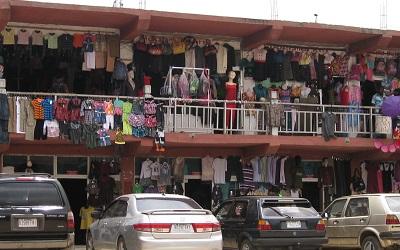Day 59, Year of Mygration: The reality of China in Africa

Following on from a previous blog post, which explored the rise of China in Africa, today's piece features an article from the online journal of the China Policy Institute, written by Dr Ben Lampert, Lecturer in International Development at The Open University and Professor Giles Mohan, Director of the OU's Research Network in International Development and Inclusive Innovation.
Encouraged by a range of social and economic push and pull factors, of which China’s diplomatic charm offensive on the continent is only one, there are reports that as many as one to two million Chinese people are resident in Africa, with most having arrived since the early 2000s. Where this significant migration has been discussed, it is generally in negative terms that mirror the wider coverage of China-Africa relations framing it as the latest form of economic imperialism to afflict the continent.
As exemplified by a British newspaper article entitled ‘How China has created a new slave empire in Africa’, a widespread contention is that Chinese enterprises operate in enclaved compounds with few connections to wider society and satisfy much of their labour needs with imported Chinese workers. When they do employ locals, it is claimed that they offer them only pitiful wages and inhumane conditions.
While it would be equally unfair to characterise relations between Chinese migrants and their African hosts as unproblematic examples of the ‘win-win’ cooperation trumpeted by Chinese and some African leaders, our research suggests that the Chinese presence in Africa can be much more locally embedded and beneficial than is often recognised.
China-Africa headlines are often captured by large-scale, Chinese-backed energy and infrastructure projects in Africa. These are usually carried out by Chinese state-owned enterprises with political and financial support from the Chinese state. Such projects are undeniably a key marker of China’s heightened engagement with Africa and reflect to various degrees China’s geo-political ambitions around resource extraction, market entry and diplomacy. They are also an important driver of Chinese migration to Africa, involving the deployment of Chinese managers, engineers and workers, usually on short-term contracts of a few years duration.
We find young Chinese graduates appointed to positions in African countries to help establish and manage local branches for their corporate employers, introducing products and services ranging from tomato paste to telecoms equipment. For these dynamic professionals, moving to Africa represents an opportunity to escape an intensely competitive graduate jobs market in China, often earn higher salaries than they might attain at home, and gain language skills and international exposure.
Significantly, the vast majority of these entrepreneurial and professional migrants and their businesses rely on developing strong local connections, especially in terms of engaging local customers and employing local labour. In the latter case, our research in Ghana and Nigeria identified this at a variety of scales, from the independent Chinese traders in markets in Lagos and Accra who generally employ at least a couple of local assistants all the way through to the largest Hong Kong Chinese-owned industrial groups that employ thousands of African workers.
Chinese entrepreneurs and managers often emphasized that employing Africans was central to their business strategies, it being seen as considerably cheaper than importing workers from China and essential to understanding the local market. Furthermore, while management positions tend to be dominated by Chinese staff, having at least some Africans in these roles is often considered useful, particularly in dealing with government officials and managing local workers. In some cases, African staff constitute a significant proportion of management and/or have risen to some of the most senior positions.
In such ways, Chinese migrants and enterprises can be much more embedded in African societies and economies than is often realised. Where such embeddedness is acknowledged, it tends to be the resultant conflicts that are emphasised. Our research certainly confirms that significant tensions have emerged such as some Ghanaian traders agitating against the rapid expansion of Chinese traders in central Accra and Nigerian trade unions protesting at the poor treatment of local labour in some Chinese-owned factories.
As serious as these tensions are, they often represent wider conflicts than the outcome of Chinese migration alone. For example, Ghanaian traders’ agitation about Chinese competitors has been part of a broader campaign about the impact of foreign traders in general in which the greatest concern was reserved for Nigerian traders. Similarly, Nigerian trade unions note that poor wages and conditions are far from unique to Chinese factories and represent issues across the manufacturing sector, involving a range of foreign and locally-owned companies and raising the need for more effective regulation by the Nigerian authorities.
Furthermore, what tends to be overlooked is that more cooperative and mutually beneficial relations also emerge. In our research, we have documented how some Ghanaians and Nigerians enjoy good working relations with their Chinese bosses and colleagues, generating Sino-African socialising, friendships, and business and personal partnerships. Importantly, these more convivial relations have generated significant opportunities for African actors to develop their skills, advance their careers, and pursue new business opportunities.
For example, a Nigerian entrepreneur in Lagos utilised the Chinese connections he had developed working at a Chinese company and, subsequently, with a Chinese business partner to establish his own business importing Chinese goods. He now has one of the largest and most popular shops in the Lagos ‘China Town’ retail complex and is also using his networks to meet Chinese investors interested in supporting his long-standing ambition to mine minerals in south-east Nigeria for export to China.
Similarly, Nigerian employees of one of the Chinese telecoms companies operating in Nigeria have taken advantage of the extensive hands-on training provided by the company to launch fast-moving careers in the country’s booming telecoms sector. For instance, a Nigerian who had risen to a senior position in the Chinese company argued that what he learnt there enabled him to establish his own telecoms services firm.
All this came from my last place of work. The Chinese trained me.
His company now enjoys substantial contracts with most of the big telecoms companies in Nigeria and employs more than 100 staff, many of whom he has trained by drawing on the expertise he gained at the Chinese company.
It is clear that while there are undoubtedly serious tensions around the rapid growth of Chinese migration to Africa, everyday Sino-African encounters can be much more convivial, cooperative and mutually beneficial than is often portrayed. Key here is the role of African agency – rather than being the oft-portrayed victims of mobile Chinese investors, Africans are actively shaping their relations with Chinese actors in ways that further their own interests and potentially promote African development. Recognising this is central to better understanding these informal, everyday encounters which, in turn, are likely to be as important as formal state-to-state negotiations in determining the nature and outcomes of Sino-African relations.
Read the original journal article in the online journal of the China Policy Institute
Quarterly Review of Research
Read our Quarterly Review of Research to learn about our latest quality academic output.

Contact our news team
For all out of hours enquiries, please telephone +44 (0)7901 515891
Contact details